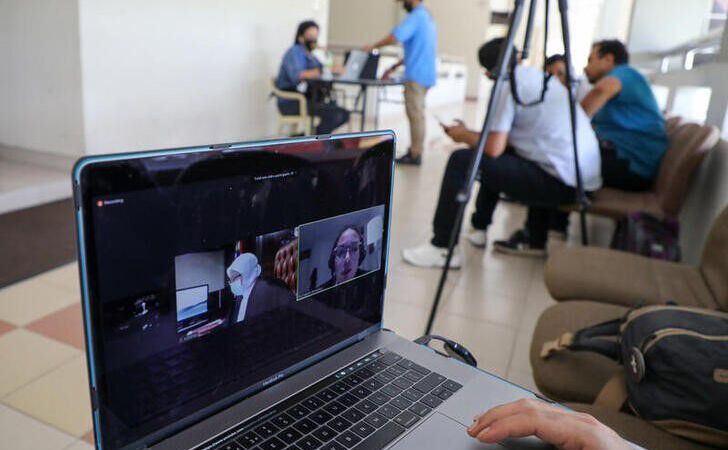As more advanced technology offers the opportunity to greatly improve access to justice for many citizens, the push for regulatory reform is following close behind
For decades, industry regulations about who can provide legal assistance, under what circumstances, and in what format have limited access to justice for those most in need. Now, a new wave of reforms promises to change the way legal services are provided and could significantly impact how justice tech organizations scale their work.
In a May decision from the US District Court for the Southern District of New York, Upsolve, Inc. et al v. James, Upsolve, a nonprofit that helps individuals file for bankruptcy for free, challenged the state’s application of the unauthorized practice of law to other trained professionals. To help low-income individuals facing debt collection navigate and respond to their suits more readily, Upsolve launched the American Justice Movement program in January, which trains professionals to offer complimentary legal advice about whether and how to respond to debt collection lawsuits. Specifically, the volunteers sought to help New Yorkers fill out checkboxes on a one-page answer form provided by the State of New York to avoid automatic default.
In the Upsolve case, the New York Attorney General argued that such guidance was the unauthorized practice of law, but ultimately, the judge ruled that those rules did not apply to the program because the legal advice was protected as speech under the First Amendment. The court also stated that the advice mitigated the risk of harm to the consumer while addressing a significant legal problem area, further in favor of the decision.
In our new column, NextGen Justice Tech, by Kristen Sonday, we will take a look at the people, trends, and technology shaping the future of access to justice.
The ruling is monumental because it allows legal professionals to provide guidance on completing legal forms that might be applied to other areas of law, including through online tools that can reach exponentially more individuals.
“By ruling in favor of Upsolve, the Southern District of New York… established a new First Amendment right in America: the right for low-income families to receive free, vetted, and accountable legal advice from professionals who aren’t lawyers,” said Rohan Pavuluri, Upsolve’s Co-Founder and CEO.
If further applied to online forms and filing apps, then tech companies, court employees, and other volunteers would be able to assist people with basic questions about whether and how to respond to government requests, vastly expanding the number of people who can help. For individuals who are too afraid or uncertain of navigating such services on their own, this support would provide peace of mind and tangible next steps to assist significantly more low-income folks in managing the legal process.
The “sandbox” model
The implementation of state-run legal tech sandboxes is another opportunity to spur justice-related innovation. Utah was the first state to launch such a sandbox in August 2020, in which lawyers and legal professionals can develop and promote new legal solutions under the supervision of the state’s Supreme Court. One year in, the Utah Supreme Court had approved 30 companies, including those that created initiatives to provide individuals help completing court forms and receiving legal advice via chatbot.
The sandbox concept helps mitigate risk for justice tech founders since they’re building and testing ideas alongside a legal authority. In addition, through this model, “justice technology companies can partner with authorized legal services providers to offer consumers actual legal advice. Attorneys are the most obvious partners, but authorized document preparers, among others, are an often-overlooked partner,” says Natalie Knowlton, Founder of Access to Justice Ventures.
Finally, the Association of Professional Responsibility Lawyers (APRL) has made a powerful recommendation to update the American Bar Association’s (ABA’s) Ethics Rule 5.5 and permit lawyers who are admitted in any jurisdiction to be able to practice across others. “Our proposal advocates that a lawyer admitted in any United States jurisdiction should be able to practice law and represent willing clients without regard to the geographic location of the lawyer or the client, without regard to the forum where the services are to be provided, and without regard to which jurisdiction’s rules apply at a given moment in time,” the APRL wrote in its letter to the ABA president.
This change would be significant for justice technology companies and non-profits in that their lawyers would be able to serve individuals across jurisdictions, regardless of lawyer or client location. Justice tech companies would save time and money by being able to serve more individuals virtually, and with a leaner staff, could free up capital for other initiatives. For tech companies that currently have to hire staff who are licensed in each state in which they want to provide lower cost legal services, this reform would be game-changing.
“As a startup, an update to Rule 5.5 would allow us to move much faster in expanding our services to those in need,” says Erin Levine, the Founder and CEO of HelloDivorce. “We would be able to hire and train fewer, high-quality lawyers that provide consistency in our services across jurisdictions, as well as quickly build out subject matter expertise that can increase the number of clients served.”
Further, under this scenario, legal services organizations would be able to refer pro bono clients to attorneys across the country, making those referrals more efficient and potentially better aligned. The rule also would greatly enhance access for folks in rural areas, as they often are limited to those lawyers in nearby metro areas who might work on their matters.
By being able to access legal assistance from anywhere in the United States — via in person or online, through lawyers or other approved professionals — the magnitude by which the legal profession could greatly help those in need through better legal reforms is significant for the justice tech community and underserved citizens across the country.







